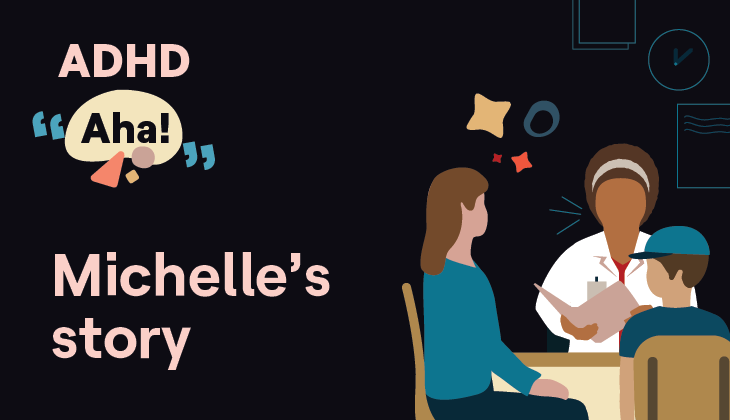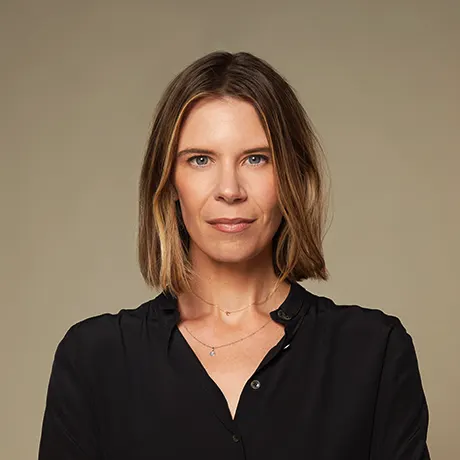Stay in the know
All our latest podcasts delivered right to your inbox.
Like many parents, Michelle Lassiter started to notice her own ADHD symptoms during her son’s evaluation for ADHD. In this episode, Michelle, whose mom is from the Dominican Republic, looks back on how ADHD impacted her growing up in Mexico, Venezuela, and Puerto Rico. And she connects this to her son’s experience with ADHD — confusing signs, feeling “stupid,” and the strengths they share.
Michelle also talks about parenting a child with ADHD when you have ADHD yourself: “When you’re also lacking those skills, it is very tough.”
Related resources
Episode transcript
Michelle: I was reading this book because I was trying to learn about ADHD for my son. And for me, it was just so emotional because I was realizing that was me. I had struggled with all these things in school, and that's why I didn't like being in school. The report cards where, you know, "She's a sweet girl. She needs to work harder."
I always felt smart, but I always felt like something wasn't really working. So as I'm reading, realizing he has ADHD, I started realizing I was struggling with the very same thing as he was.
Laura: From the Understood Podcast Network, this is "ADHD Aha," a podcast where people share the moment when it finally clicked that they or someone they know has ADHD. My name is Laura Key. I'm the editorial director here at Understood. And as someone who's had my own ADHD "aha" moment, I'll be your host.
I'm here today with Michelle Lassiter. Michelle is a bilingual speech-language pathologist who's lived in many places, including Mexico, Venezuela, and Puerto Rico. Michelle has ADHD, and so does her son, Aidan.
She also happens to be one of my colleagues here at Understood. I'm so grateful to work with her. And I'm so grateful that she's here today. Hi, Michelle.
Michelle: Hi, Laura. Thank you so much for that sweet introduction.
Laura: Can you tell me about Aidan? What was he like growing up?
Michelle: Oh, so, Aidan has always had just a huge personality, a huge presence. I remember coming home from the hospital with him and my mom saying, "Oh my gosh, this child is a live wire," because he just — his presence filled the room from the moment he was born. And he was very smart. He was very sweet, very active, just very physically — he'd climb up me, or he just was never still. He wouldn't sleep. But he's always been just a joy to have.
Laura: Did you ever notice any ADHD symptoms early on with him?
Michelle: I have been a speech pathologist for over 25 years, and I was a brand-new speech pathologist when I had Aidan. He was always extremely active, but it wasn't until about 18 months — I just felt like something was not right. And he was talking, but he wasn't using language, putting words together. I noticed he didn't have any interest in sitting down with a book, learning little songs. He enjoyed singing them, but he wasn't learning the words. So, I want to say about 18 months, I went back to my pediatrician and I was like, "I'm really worried about this. I've seen this in some of the children that had been referred to me. Do you think he might be on the spectrum?" And I remember the pediatrician saying, back then, "Michelle, he's just very excitable. He's not on the spectrum." That is the very first time somebody alerted me to the fact that he might have ADHD.
Laura: You weren't on board with that at first. You didn't believe it. He was young.
Michelle: He was, and he definitely had all the signs and symptoms. I definitely knew something was off, but I wasn't ready to hear that yet. It's just a tough process, when you've got your beautiful baby, to think that it's not going to be everything that you hoped and planned for. As a new parent, it's definitely a daunting journey not to know. "I'm seeing some things; they're raising concerns. Is this typical?" I think that's really where I was still.
Laura: And then later, in preschool, you started to notice more of what your doctor — it was Dr. Vasquez, no? — what Dr. Vasquez was noticing?
Michelle: Yes. At that point in time, we had moved to Puerto Rico, and we put him in a bilingual school. His preschool teacher started telling us, "He really doesn't like to color within the lines, and he doesn't grasp his crayon well, and he can't sit still. You really need to have him evaluated by an OT."
Laura: An OT being an occupational therapist.
Michelle: That's absolutely right. And at that time, the occupational therapist had told us, "You know, his pencil grip isn't great. He'd much rather be outside riding a bike. I mean, he definitely just doesn't have the attention to sit down and dedicate to this."
So she felt like a lot of his fine motor skills were being impacted because he preferred doing gross motor things outside. And for him, it was a chore to sit and try to do these small fine motor movements. So we moved forward to kindergarten at that school. And that's the first time a teacher had approached us and said, "I have 20 students in this classroom. And Aidan is probably the smartest in this class, but if I take him aside, I can teach him anything and he grasps it. When there's 19 other kids in the classroom, he just can't sit still enough to pay attention, you know, everything distracts him." So that was really the first time we had to sit, think about, OK, clearly intelligence isn't an issue, but he's definitely struggling to pay attention.
Laura: And how are you feeling about all of that during that time?
Michelle: It was clearly something he didn't have control over. As a parent, it was heartbreaking just because we knew how friendly and — sorry, he just wanted to be liked. You know, he just wanted to please. That's all he wanted. And you could tell, and it just wasn't working, and he couldn't figure out what he was doing wrong.
So it was — as a parent, it — oof, I'm sorry, it is emotional just because you see your child struggling, and you know that his intentions are to be loved, but something was getting in the way of that.
Laura: Do you think, Michelle, that he was aware that something was getting in the way of that? Could he express it at all?
Michelle: He couldn't. And what we decided to do, Laura, was that was around the time that we moved back stateside, and we decided, "Well, let's hold him back a year. We know that he's very smart. Maybe if we give him a year to mature, maybe that will help." So what we did was, when we moved, we put him back in preschool for that half a year, and that made him very aware. So, he was very, very aware of, "Wait a minute. I was in kindergarten over there, and now I'm back in preschool." We explained to him that he had been learning in a different language, he had been learning in Spanish, and things were different stateside, you know, and at the time, that was a good enough explanation for him. But for us, we were just really wanting him to be successful. And it was clear that even though he was grasping concepts very quickly, he was definitely struggling with things that required him to sit and pay attention, like reading, or coloring, or writing.
Laura: And then what happened? Did he get evaluated?
Michelle: We still weren't there. We let him finish out preschool in Virginia, and then he went to kindergarten again and he had this sweet, sweet teacher, brand spanking new, and Mrs. Smith was, you know what, I mean it was everything we thought would be great for someone like Aidan, cause she was bubbly, and she was young, and we kept going to our parent-teacher conferences saying, "So, how's he doing?" And we kept hearing, "Oh, he's doing great." And we're like, "Hmm, maybe we were wrong. Maybe just giving him that year would help or helped him." And we'd keep going to our parent-teacher conferences asking, "Hey, tell us what's going on with Aidan." "Oh, no, he's doing great. He's so smart. He's the smartest one here in the classroom. He knows everything he needs to know." And I want to say, that spring, Aidan first said, and I get really emotional with this story. I apologize.
Laura: But it's your child. You don't need to apologize.
Michelle: For sure. It was the first time that we felt like, "Oh, we've got to do something about this," but we'll never — I'll never forget. He came home, and he said, "I'm stupid. I can never make it to recess." And that just broke my heart. So, I asked, "Well, hey, what's going on here? Why is he not making it to recess ever? I mean, he's definitely starting to feel like he's not smart. And that was the whole purpose of us holding him back for a year." And she said, "He's really smart, but he can't ever finish his work in time. And I have to be really strict in my class. And the other students need to see that if somebody doesn't complete their work, they can't go to recess." And that was it. I was like, "Yeah, if we need to get a diagnosis so that we can get some accommodations made for him, that's what we're going to do."
Laura: I can't imagine how that must have felt, Michelle, to hear Aidan say to you, "I'm stupid," when you have been observing him being so smart, excelling in so many subjects. As the mother of two children myself, I mean, it is just — that had to be so difficult. How did you respond?
Michelle: I went mama bear on the school. And that was probably when I started advocating for my son, and I advocated for him all through school, but that was probably the very first time. He did receive a diagnosis of ADHD at the time. And we sat down with the principal and said, "Listen, this is not OK. If he needs to complete work at home, he can send homework, but he cannot miss recess. Quite on the contrary. Somebody like Aidan absolutely needs recess, and he does better with recess."
Laura: Right. That brain break, that release of energy.
Michelle: Oh, absolutely.
Laura: What did you learn through Aidan's evaluation process?
Michelle: That time was very tumultuous for me. I think that was the very first time I decided, "OK, I need to start researching and looking into this." And I think the very first book I got was "Driven to Distraction" by Ned Hallowell. And for me it was very emotional, because as I was reading it, I could clearly see that Aidan definitely fit the profile, but I could see that I had lots of those struggles throughout my own life. I had never done well in school. I was a mediocre student at best. The report cards starting in first grade were, you know, "She's a sweet girl. She needs to work harder. She needs to complete her homework. She needs to pay more attention." Or, "She needs to dedicate herself a little bit more to class." I always felt smart, but I always felt like something wasn't really working. So as I'm reading this book, realizing he has ADHD, I started realizing I was struggling with the very same thing as he was. I wasn't hyper. I do remember my mom saying that I wouldn't sleep, like him. But I was very reserved. I was very quiet, so I didn't stick out that much in class. But, yeah, that was definitely my "aha" moment. I realized there was a name for what I had felt in school and that's why I had always been successfully unsuccessful. It just had never clicked. I mean, learning disabilities and ADHD, back when I was growing up, was just never spoken about, especially in Latin communities.
There's very little awareness. So, for me, it was extra emotional going through this process because I was going through it as a parent, but I was also mourning, myself, and realizing that I could have had support. And at the same time, realizing that, you know, I had done something just out of pure resilience. I knew something wasn't right, and I just figured I couldn't give up. So it was a tough time for sure.
Laura: Growing up, did your parents notice you struggling like this?
Michelle: My mom was in education, so when I was going through this, I went back and I chatted with her. And I did ask her, "Hey, did you not notice that this was going on?" She basically just said, "I just didn't have very high expectations. I just didn't think that you were the smartest child in your class," kind of something to that effect. And I — Mom, forgive me — but, I mean, she just thought that I wasn't that smart, I guess. And I think that's what opened my eyes to the cultural lack of awareness for learning and attention differences, and just how we handle it. We just attribute it to, "Well, they're not that smart, or maybe they are lazy." There's a lot of stigma involved with it, and there's a lot of shame. And it's just not something that is spoken about, Laura, in the Hispanic culture. It's just not the awareness that we have.
Laura: And this is not about judgment of people noticing or not noticing. That's actually why we're here, talking about the things that you notice both in yourself and in Aidan. It took me 30 years. Right? It took — everyone I talked to on this podcast, there was a long period of time during which they were confused or the people around them were confused. And I think you're right, because there is a lot of shame and it can be baffling sometimes. I'm hearing this thread in your story about Aidan, who obviously is extremely intelligent but thought he was stupid. And he's not stupid. You worrying about being perceived that way and even potentially being perceived that way in your own family, for better or worse. Now, you were diagnosed five years ago. Is that right?
Michelle: That's correct. Laura: So, we know that ADHD tends to run in families. A child with ADHD has a one-in-four chance of having at least one parent who has it. Do you ever notice signs of ADHD in your mom, for instance? Have you?
Michelle: For sure, in both of my parents. So, my mom, she was always a very high achiever.
She definitely struggled to keep things organized. And even though she was definitely never diagnosed with anything, I do find she gets easily distracted and is forgetful. I didn't realize the symptoms until I started researching them in myself.
My dad, on the other hand, was very much like Aidan. Just brilliant. He knew five languages, and he studied business because he felt like he had to support a family, but he hated it. And he was just very much — if there had been anyone that would have for sure received a diagnosis, I think it would have been him.
Laura: I work with you, Michelle. You are not stupid in any way. And I hate — that's a gross word. I want to flip it. You are extremely intelligent. I see that every day, working with you, and you accommodate for your challenges, and it just makes you stronger.
Michelle: It has been a learning process, Laura. And I've always felt very smart, but in an intuitive sense, not so much in a book-smart way. And I have to say that even as I realized going through Aidan's diagnosis, "Hey, this is what I have," it took almost 20 years for me to go and get myself diagnosed. Because even though I had the awareness of, yeah, he clearly got this from me, and I could talk about it, and I was advocating for him, I just never felt like, "Well, this is about me and my disability." I always felt, "Well, this is about him." I'll never forget having those conversations of, "Well, you need to organize his backpack and you need to organize his schedule and you need to keep him on a routine." And I finally told our pediatrician, I was like, "I can't do that. So you're expecting me to do with him something that I don't have the skills to do."
And I think that is what eventually led me to getting a diagnosis and getting the support that I needed, because it was very hard. I know that, as a parent, you want to do what those caregivers are telling you to do with your child. But when you're also lacking those skills, it is really tough.
If you don't look for the support that you need, it's very tough to support your child. So, yeah, that was pivotal in me seeking out my own diagnosis.
Laura: How are you coping? What did that ADHD diagnosis, like, how did that help you get the support and accommodations that you needed?
Michelle: I think in my case it was more relief. Because even though I knew it, just somebody telling me, "It's OK, this is just the way you think," allowed me to be forgiving with myself. It allowed me to be a better therapist. You know, I was working in the preschool by the time I did get a diagnosis, and a lot of parents were coming to see me with concerns about their own children. And it was so much easier to say, "Hey, listen, it's going to be OK. I was in your shoes with my own son, and I was in your shoes as an adult with ADHD." Let's find a village, but allow yourself to realize that we all have strengths, and we all have things that we're not so good at. Let's support those things we're not so good at while we are highlighting those strengths. I think that helped my conversation with those parents of children that I was treating. But it also helped with my healing process.
Laura: I was thinking earlier about, you know, everything you were saying about what Aidan was going through. And I was just wondering, did your relationship with Aidan change when you found out that you had ADHD, or even when you suspected it?
Michelle: For sure. So, the joke in our family is that Aidan and I understand each other, that we speak the same language, even though sometimes it's hard to come up with the words or the right language that we want to use. We are really good at other things. And we could definitely talk to each other about, "OK, yeah, so we can't keep our sock drawer clean, but we're very intuitive, and looking at other people and seeing what they're feeling, perhaps."
Laura: I love that, Michelle. It sounds like there's just a lot of electricity in the air between you and Aidan.
Michelle: For sure. It helps that when he was little, when we first went to get that diagnosis, I said his pediatrician at that time was very good and I'll never forget. Her name was Dr. Sprinkle. And she told us — it was amazing. And of course, I'm in tears because I know this is what's coming, and I'll never forget. She said, "Michelle, in an agrarian society, ADHD — it's not that it didn't exist, but we were out, and we were in the field. So, we weren't having to sit for hours on end and we weren't having to pay attention for hours on end. So, it wasn't a thing. But your child lives in this world, and he is being judged by others in this world.
And I remember her saying, "The side effects of medication are short-term; the side effects of a low self-esteem because others don't understand your child are for life." And that's when I was able to have that conversation with Aidan and say, "You know, our brains are just different." We think in different ways; we have other gifts. So letting people judge us by the things that we can't do is just short-sighted by other people. And as long as we know that, it's OK.
Laura: Aidan is so lucky to have you. You are so lucky to have Aidan. The two of you together sound like two peas in a pod and are just really lifting each other up. I mean, that gives me chills, Michelle. I think it's fantastic.
Michelle: He's definitely a great kid.
Laura: How's he doing lately? What's he up to?
Michelle: Oh, my goodness. So he's made me go gray, and it has been a journey of highs and lows with a child with ADHD. We continued on, and there was definitely other things going on. So, he eventually got diagnosed with learning disabilities and stealth dyslexia. He graduated high school, and he got a scholarship to play lacrosse at the university. And it was a very exciting time. With COVID, he definitely struggled big time. And he was injured. He couldn't play lacrosse, and he was not doing well in school. And he was definitely not thriving with online instruction. And last December, we had to pull him out of school. I mean, he was probably the lowest point I've ever seen him. Just very depressed. We were very worried about him. But we put him in a community college near us, and we were rehabbing him as far as his physical injuries.
And he's really good at things outdoors. He's always good with wilderness. And so we signed him up for a wilderness school. He was accepted. When it came time for him to go, he was, like, "I really think I would love this, but I need to go back to school and finish what I started." And both my husband and I were, like, "That might not be the right environment for you; we're not a hundred percent sure." But he worked his behind off, and he got back to the university where he was initially accepted to. And he's been working with the lacrosse coach and getting himself back on track. And he texted me last night, he got a 91 on his accounting midterm. So he is definitely grown up, and he has worked really hard to get where he is.
Laura: Wow, Michelle, I mean, if that's not a story of resilience, I don't know what is.
Michelle: It's amazing to watch. He's definitely my hero. He's not the perfect child, but he's definitely perfect for us.
Laura: Michelle, thank you so, so much for being here. I know you from working with you. I see you in action. You do such great work for Understood. But talking with you, hearing your story, hearing about Aidan, I just feel even more deeply connected to you now. So, thank you so much for being here.
Michelle: The pleasure's all mine. Thank you so much for having me, Laura.
Laura: You've been listening to "ADHD Aha," from the Understood Podcast Network. You can listen and subscribe to "ADHD Aha" on Apple, Spotify, or anywhere you get your podcasts. And if you like what you heard today, tell someone about the show. We rely on listeners like you to reach and support more people. And if you want to share your own "aha" moment, email us at ADHDAha@understood.org. I'd love to hear from you. You can go to u.org/ADHDAha to find details on each episode and related resources. That's the letter U, as in Understood, dot O R G, slash ADHD Aha.
Understood is a nonprofit and social impact organization. We have no affiliation with pharmaceutical companies. Learn more at understood.org/mission.
"ADHD Aha" is produced by Jessamine Molli. Say hi, Jessamine.
Jessamine: Hi, everyone.
Laura: Justin D. Wright created our music. Seth Melnick and Briana Berry are our production directors. Scott Cocchiere is our creative director. And I'm your host, Laura Key, editorial director at Understood. Thanks so much for listening.
Host
Latest episodes
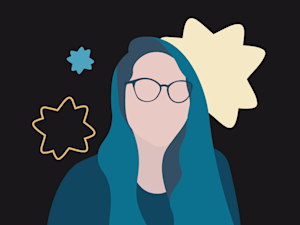
April 16, 2024
ADHD coach Jaye Lin was a gifted kid with undiagnosed ADHD. Now, she’s building communities and helping others cope with ADHD burnout.
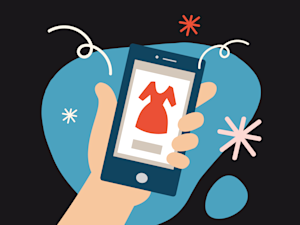
April 2, 2024
Writer Paulette Perhach had money coming in but struggled to keep it in her bank account. An ADHD diagnosis brought her struggles into perspective.
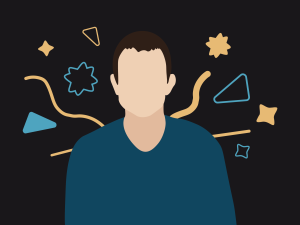
March 19, 2024
Eye to Eye founder David Flink is fighting the “just try harder” myth surrounding ADHD, dyslexia, and other learning and thinking differences.
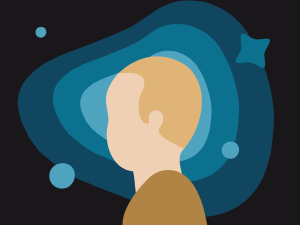
March 5, 2024
Peter Jones used to feel better saying he had a hearing problem rather than considering ADHD. Now, he knows he has ADHD and isn't afraid to say it.
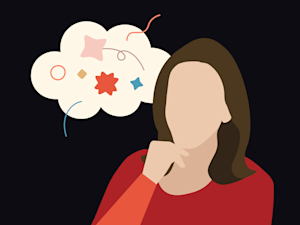
February 20, 2024
Before her ADHD diagnosis, ADHD coach Emily Weinberg thought she was just lazy. But in reality she was stuck in “analysis paralysis.”
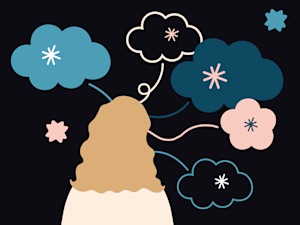
Carol Blumenstein was called an unteachable student. Now, she knows she has ADHD and dyslexia, and supports her five kids who learn differently, too.

January 23, 2024
Executive coach, actor, and former criminal defense attorney Ernest Anemone shares his ADHD story — and why he questions the term “attention deficit.”
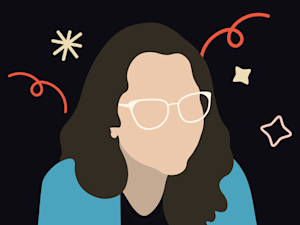
January 9, 2024
ADHD and post-traumatic stress disorder (PTSD) symptoms can look similar. And they can morph into what Hannah calls “a trauma ball of blame.”
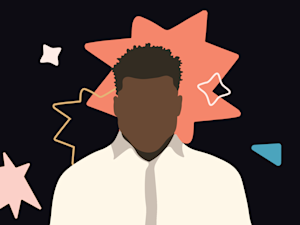
December 26, 2023
Livingston Steele was diagnosed with ADHD about a year into working at Understood.org. His experience and work have given him immense empathy for people with ADHD.
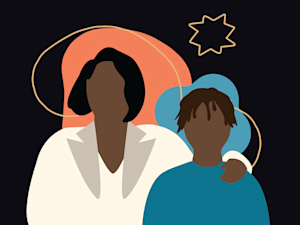
December 12, 2023
Wendy Zanders is a decluttering coach with ADHD. Find out how she got into organizing, and get a few tips for yourself.
